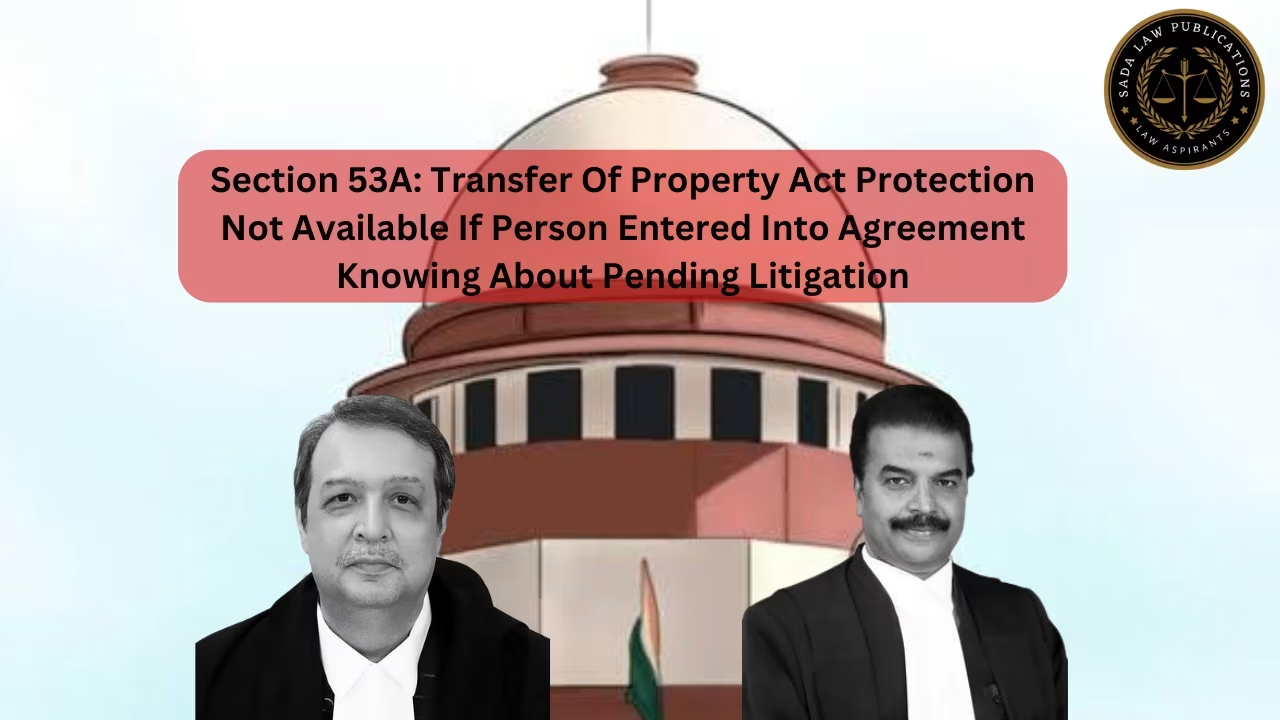Section 53A Transfer Of Property Act Protection Not Available If Person Entered Into Agreement Knowing About Pending Litigation: Supreme Court
- NITU KUMARI
- 24 Mar 2025

Civil Appeal No. 3616 of 2024
RAJU NAIDU … Appellant
Versus
RESPONDENTS COURT, SC … Respondents
Date Of Judgment: March 21, 2025
Presiding Judges:
Justice J.B. Pardiwala
Justice R. Mahadevan
Background Of The Case:
The crux of the problem is in Pondicherry‘s ‘A’ and ‘B’ Schedule properties. The appellant Raju Naidu‘s claim to the ‘B’ Schedule property was based on a sale agreement with the original owner that was executed during ongoing legal processes regarding the property’s title.
Issue Of The Case:
Whether a party who enters into a real estate transaction knowing that litigation is still pending is protected under Section 53A of the Transfer of Property Act, 1882?
What is Section 53A Of Transfer Of Property Act 1882?
53A. Part performance.—
Where any person contracts to transfer for consideration any immovable property by writing signed by him or on his behalf from which the terms necessary to constitute the transfer can be ascertained with reasonable certainty,
and the transferee has, in part performance of the contract, taken possession of the property or any part thereof, or the transferee, being already in possession, continues in possession in part performance of the contract and has done some act in furtherance of the contract,
and the transferee has performed or is willing to perform his part of the contract,
then, notwithstanding that where there is an instrument of transfer, that the transfer has not been completed in the manner prescribed therefor by the law, the transferor or any person claiming under him shall be debarred from enforcing against the transferee and persons claiming under him any right in respect of the property of which the transferee has taken or continued in possession, other than a right expressly provided by the terms of the contract:
Provided that nothing in this section shall affect the rights of a transferee for consideration who has no notice of the contract or of the part performance thereof.
What is the Doctrine of Lis Pendens?
The doctrine of Lis Pendens prohibits parties from undermining court proceedings by property transfers by stating that transactions undertaken while a lawsuit is active are subject to the resolution of that lawsuit.
The transferee must act in good faith in order to be protected under Section 53A. This good faith is undermined when one enters into a deal knowing that there are ongoing conflicts.
By preventing the transferee from asserting Section 53A protection, knowledge of pending litigation acts as constructive notice.
Precedent Analysis:
Giriyappa & Anr. vs. Kamalamma & Ors. 2024
In this case, the Court held that the petitioners failed to prove the sale agreement and meet these conditions. As a result, they could not claim protection under Section 53A. The petition was dismissed.
The Court outlined the conditions for invoking Section 53A:
A written and signed contract for transferring immovable property that specifies the terms of the transfer.
The transferee must have taken or retained possession of the property in part-performance of the contract.
The transferee must have performed or be willing to perform their contractual obligations.
Judgment:
A bench of Justice J.B. Pardiwala and Justice R. Mahadevan was hearing an appeal against the Karnataka High Court‘s decision, which upheld the rulings of the Trial Court and First Appellate Court. These courts had ruled in favor of the plaintiff-respondent, declaring title and granting recovery of possession.
The Supreme Court ruled that a transferee who enters into a property agreement knowing of ongoing litigation is not entitled to protection under Section 53A. The Court underlined that the rights granted by such an arrangement are not superior to those of the original transferor. It said that any transfer made during litigation is subject to the resolution of that action due to the application of the doctrine of lis pendens.
Conclusion:
The Supreme Court‘s ruling emphasizes how important it is to conduct extensive due diligence before purchasing real estate. Since entering into agreements with knowledge of ongoing litigation excludes protection under Section 53A of the Transfer of Property Act, parties must make sure that properties are free of legal problems before moving further.
Live Cases






